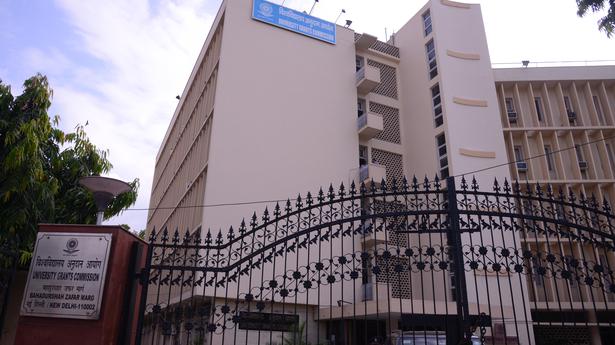
UGC proposes clustering of colleges for multidisciplinary learning
The Hindu
These guidelines aim to help State governments and universities frame appropriate rules and policies
The University Grants Commission (UGC) has finalised guidelines for transforming colleges and universities into multidisciplinary institutions and has prescribed three different approaches which include “clustering” of establishments located in proximity to each other.
The UGC will make public its “Guidelines for Transforming Higher Educational Institutions in to Multidisciplinary Institutions” on Friday. These aim to help State governments and universities frame appropriate rules and policies. Promoting multidiscplinary institutions was a key recommendation of the National Education Policy 2020.
The UGC has suggested academic collaboration between institutions through “clusters” of higher education institutions (HEIs) in order to promote multi-disciplinary education and research in online and offline modes.
The cluster system will help single-stream institutions with poor enrolment due to lack of employment- oriented, innovative multidisciplinary courses and lack of financial resources and help such centres improve their grades in National Assessment And Accreditation Council (NAAC) accreditation, say the guidelines. They will have to design their timetable in consultation with partner institutions so that students can register for courses offered by them without facing scheduling clashes.
The member colleges in a cluster will continue to function as affiliated colleges under the university in the initial phase during which they will share their resources to offer programmes and guide student research projects. After the initial years, the affiliating university may affiliate the cluster of colleges as a single unit during which they will pass through graded autonomy before developing into an autonomous degree-granting cluster of college. These can then later evolve into Research or Teaching Universities.
The UGC has also prescribed two other approaches for existing colleges and universities to become multi-disciplinary. These include merger of single-stream institutions with other multidisciplinary institutions under the same management or different managements, as well as expanding the number of departments in a college or university by adding new subjects such as languages, literature, music, Indology, sports, etc.
Students opting for courses offered as a result of collaborations and mergers can also avail credit mobility between partnering institutions as the National e-Governance Division of the Ministry of Electronic and Information Technology (MeitY) has developed the ABC platform which allows students to open an academic account and add HEIs of interest and store credits earned from them for receiving degrees and diplomas.





















 Run 3 Space | Play Space Running Game
Run 3 Space | Play Space Running Game Traffic Jam 3D | Online Racing Game
Traffic Jam 3D | Online Racing Game Duck Hunt | Play Old Classic Game
Duck Hunt | Play Old Classic Game











